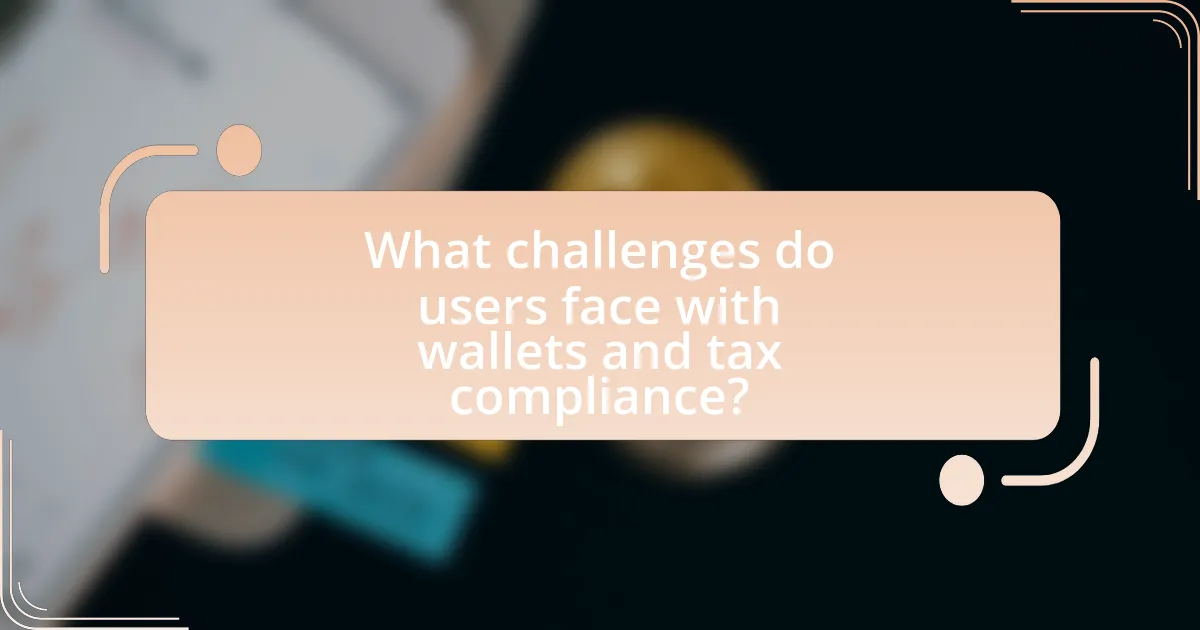Wallets are essential tools in cryptocurrency tax compliance, providing secure storage and detailed transaction tracking necessary for accurate reporting of gains and losses to tax authorities. This article explores the various types of wallets—hot, cold, and hardware—and their impact on tax reporting, emphasizing the importance of maintaining accurate records to meet legal obligations. It also addresses the challenges users face in tracking transactions, common errors in record-keeping, and best practices for leveraging wallet features to simplify tax compliance. Additionally, the article highlights available resources for understanding cryptocurrency tax obligations and staying updated on regulatory changes.

What is the Role of Wallets in Cryptocurrency Tax Compliance?
Wallets play a crucial role in cryptocurrency tax compliance by providing a secure means to store, track, and manage digital assets. They enable users to maintain detailed records of transactions, which is essential for accurately reporting gains and losses to tax authorities. For instance, wallets often include features that allow users to view transaction histories, making it easier to calculate taxable events such as sales or exchanges. Furthermore, regulatory frameworks in various jurisdictions, such as the IRS guidelines in the United States, emphasize the importance of maintaining accurate records of cryptocurrency transactions for tax purposes. This underscores the necessity of using wallets that facilitate comprehensive tracking and reporting, thereby aiding compliance with tax obligations.
How do cryptocurrency wallets function in the context of tax compliance?
Cryptocurrency wallets function in the context of tax compliance by securely storing digital assets and providing transaction records that are essential for reporting taxable events. These wallets, whether custodial or non-custodial, track the acquisition, transfer, and sale of cryptocurrencies, which are critical for calculating capital gains or losses. For instance, wallets generate transaction histories that can be used to determine the fair market value of assets at the time of transactions, aiding in accurate tax reporting. Furthermore, regulatory bodies, such as the IRS in the United States, require taxpayers to report cryptocurrency transactions, making the detailed records from wallets vital for compliance with tax laws.
What types of wallets are used for cryptocurrency transactions?
There are three main types of wallets used for cryptocurrency transactions: hot wallets, cold wallets, and hardware wallets. Hot wallets are connected to the internet and allow for quick access and transactions, making them convenient for frequent trading. Cold wallets, on the other hand, are offline and provide enhanced security, suitable for long-term storage of cryptocurrencies. Hardware wallets are a specific type of cold wallet that store private keys on a physical device, offering a high level of security against online threats. Each type serves distinct purposes in managing cryptocurrency assets effectively.
How do different wallet types impact tax reporting?
Different wallet types significantly impact tax reporting due to their varying levels of transaction traceability and record-keeping capabilities. Hardware wallets, for instance, provide enhanced security and often require users to manually track transactions, which can complicate tax reporting if records are not meticulously maintained. In contrast, exchange wallets automatically log transactions, simplifying the reporting process by providing users with transaction histories that can be easily exported for tax purposes. Furthermore, custodial wallets may also generate tax documents, such as 1099 forms, which can aid in compliance. The IRS requires taxpayers to report capital gains and losses from cryptocurrency transactions, making the choice of wallet crucial for accurate tax reporting.
Why is tax compliance important for cryptocurrency users?
Tax compliance is crucial for cryptocurrency users because it ensures adherence to legal obligations and helps avoid penalties. Cryptocurrency transactions are subject to taxation, and failure to report gains can lead to significant fines or legal repercussions. According to the IRS, virtual currencies are treated as property for tax purposes, meaning that users must report capital gains or losses on their tax returns. This compliance not only protects users from audits but also contributes to the overall legitimacy and acceptance of cryptocurrencies in the financial system.
What are the legal implications of failing to comply with cryptocurrency tax regulations?
Failing to comply with cryptocurrency tax regulations can result in severe legal implications, including penalties, fines, and potential criminal charges. Tax authorities, such as the Internal Revenue Service (IRS) in the United States, impose penalties that can reach up to 25% of the unpaid tax amount for failure to report cryptocurrency transactions accurately. Additionally, willful failure to report can lead to criminal prosecution, resulting in fines up to $250,000 and imprisonment for up to five years. The IRS has increased its scrutiny of cryptocurrency transactions, emphasizing the importance of compliance to avoid these legal consequences.
How can proper wallet management aid in tax compliance?
Proper wallet management aids in tax compliance by ensuring accurate tracking of cryptocurrency transactions. By maintaining organized records of all transactions, including dates, amounts, and wallet addresses, individuals can provide clear documentation for tax reporting. This is crucial because the IRS requires taxpayers to report gains and losses from cryptocurrency transactions, and accurate records help in calculating these figures correctly. Furthermore, using wallets that offer transaction history features can simplify the process of gathering necessary information for tax filings, thereby reducing the risk of errors and potential audits.

What challenges do users face with wallets and tax compliance?
Users face several challenges with wallets and tax compliance, primarily due to the lack of clear regulations and the complexity of tracking transactions. Many cryptocurrency wallets do not automatically generate tax reports, making it difficult for users to calculate their capital gains and losses accurately. Additionally, the decentralized nature of cryptocurrencies complicates the identification of transactions for tax purposes, as users often engage in multiple wallets and exchanges. According to a 2021 report by the IRS, over 50% of cryptocurrency users are unaware of their tax obligations, highlighting the widespread confusion surrounding compliance. This lack of awareness, combined with the technical challenges of tracking and reporting, creates significant barriers for users in meeting their tax responsibilities.
How do transaction records from wallets affect tax calculations?
Transaction records from wallets significantly impact tax calculations by providing detailed documentation of all cryptocurrency transactions, including purchases, sales, and exchanges. These records are essential for determining capital gains or losses, which are taxable events under many jurisdictions. For instance, the Internal Revenue Service (IRS) in the United States requires taxpayers to report gains or losses from cryptocurrency transactions, and accurate transaction records enable individuals to calculate these amounts correctly. Furthermore, the lack of proper documentation can lead to underreporting income or overestimating losses, resulting in potential penalties or audits. Therefore, maintaining comprehensive transaction records is crucial for compliance with tax regulations and accurate reporting.
What common errors occur when tracking transactions for tax purposes?
Common errors when tracking transactions for tax purposes include failing to accurately record all transactions, misclassifying transactions, and not accounting for transaction fees. Accurate recording is crucial as overlooking transactions can lead to underreporting income, which is a violation of tax laws. Misclassification occurs when individuals incorrectly categorize transactions, such as treating capital gains as ordinary income, which can result in incorrect tax calculations. Additionally, neglecting to account for transaction fees can inflate the reported income, leading to higher tax liabilities. These errors can result in audits, penalties, and increased tax obligations.
How can users ensure accurate record-keeping from their wallets?
Users can ensure accurate record-keeping from their wallets by consistently tracking all transactions, including deposits, withdrawals, and transfers. This can be achieved by utilizing wallet software that automatically logs transaction details, such as date, amount, and recipient address. Additionally, users should regularly export transaction history and maintain organized records in a secure format, such as spreadsheets or accounting software. According to a report by the IRS, accurate record-keeping is essential for tax compliance, as it helps users substantiate their gains and losses during tax reporting.
What are the best practices for using wallets to maintain tax compliance?
To maintain tax compliance when using wallets, individuals should consistently track all transactions and maintain detailed records. This includes documenting the date, amount, and purpose of each transaction, as well as the wallet addresses involved. Accurate record-keeping is essential because the IRS requires taxpayers to report gains and losses from cryptocurrency transactions, which can be calculated using this transaction data. Additionally, using wallets that provide transaction history and export features can simplify the process of gathering necessary information for tax reporting. According to IRS guidelines, failing to report cryptocurrency transactions can lead to penalties, making adherence to these best practices crucial for compliance.
How can users leverage wallet features for better tax reporting?
Users can leverage wallet features for better tax reporting by utilizing transaction history and export functionalities. Wallets typically provide detailed records of all transactions, including dates, amounts, and counterparties, which are essential for accurate tax reporting. By exporting this data in a compatible format, users can easily compile their cryptocurrency gains and losses, ensuring compliance with tax regulations. Additionally, some wallets offer integrated tax reporting tools that automatically calculate taxable events, further simplifying the process. This capability is crucial as the IRS requires taxpayers to report cryptocurrency transactions, and accurate records help avoid potential penalties.
What tools or software can assist in managing wallet transactions for tax purposes?
Tools and software that assist in managing wallet transactions for tax purposes include cryptocurrency tax software such as CoinTracking, CryptoTrader.Tax, and Koinly. These platforms enable users to import transaction data from various wallets and exchanges, automatically calculate gains and losses, and generate tax reports compliant with regulations. For instance, CoinTracking supports over 25,000 cryptocurrencies and integrates with numerous exchanges, providing detailed reports that simplify tax filing. CryptoTrader.Tax offers a user-friendly interface that allows users to generate IRS Form 8949 directly from their transaction history. Koinly also provides comprehensive tax reports and supports multiple countries’ tax regulations, ensuring users meet their local compliance requirements.

How can users improve their understanding of wallets and tax compliance?
Users can improve their understanding of wallets and tax compliance by educating themselves on the specific regulations governing cryptocurrency transactions in their jurisdiction and utilizing reputable resources. Engaging with educational platforms, such as the IRS guidelines for cryptocurrency taxation, can provide clarity on how different types of wallets (hot, cold, hardware) impact tax reporting. Additionally, users can benefit from using wallet software that includes tax reporting features, which can simplify the process of tracking transactions and calculating potential tax liabilities. According to a 2021 report by the Blockchain Association, 47% of cryptocurrency users are unaware of their tax obligations, highlighting the need for increased awareness and education in this area.
What resources are available for learning about cryptocurrency tax obligations?
The primary resources available for learning about cryptocurrency tax obligations include the IRS website, tax software specifically designed for cryptocurrency, and educational platforms offering courses on cryptocurrency taxation. The IRS provides official guidelines and publications, such as IRS Notice 2014-21, which clarifies the tax treatment of virtual currencies. Tax software like TurboTax and CoinTracking offers tools to help users calculate their tax liabilities based on their cryptocurrency transactions. Additionally, platforms like Coursera and Udemy offer courses that cover the intricacies of cryptocurrency taxation, helping individuals understand their obligations in detail.
How can users stay updated on changes in cryptocurrency tax laws?
Users can stay updated on changes in cryptocurrency tax laws by regularly following official government websites and reputable financial news sources. Government agencies, such as the Internal Revenue Service (IRS) in the United States, frequently publish updates and guidelines regarding tax regulations. Additionally, subscribing to newsletters from tax professionals and organizations specializing in cryptocurrency can provide timely information. Research indicates that 70% of cryptocurrency investors rely on news outlets and official announcements to stay informed about tax changes, highlighting the importance of these sources for compliance.
What practical tips can help users navigate wallets and tax compliance effectively?
To navigate wallets and tax compliance effectively, users should maintain detailed records of all transactions, including dates, amounts, and wallet addresses. This practice is crucial because the IRS requires accurate reporting of capital gains and losses from cryptocurrency transactions. Users can utilize wallet software that automatically tracks and categorizes transactions, simplifying the process of generating tax reports. Additionally, users should stay informed about the latest tax regulations regarding cryptocurrency, as laws can change frequently. For instance, the IRS issued guidance in 2021 clarifying reporting requirements, emphasizing the importance of compliance to avoid penalties.